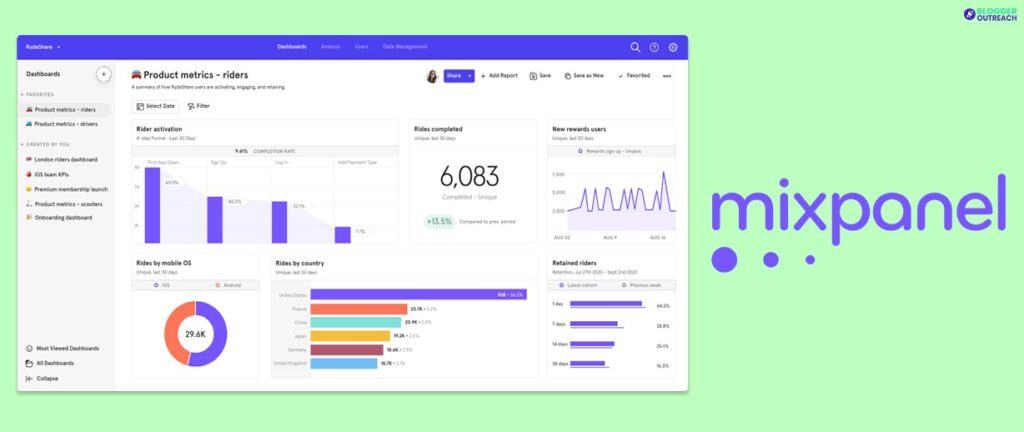Table Of Content
Are you a marketer wondering how to:
- Track your campaigns’ performance.
- Measure the success of your marketing efforts.
- Adjust your strategies accordingly.
However, with so much data to analyze, you may need help to do it all manually. Right?
That’s where marketing analytics tools come in.
Whether you’re starting as a marketer or are a seasoned pro – understanding marketing analytics and having the right tools is the key.
Sound knowledge of marketing analytics tools will give you an upper hand.
If you’re curious about marketing analytics, this article is for you. In this article, we’ll also dig deep into the world of marketing analytics and tools.
Plus, we will look at the features and benefits of each tool – how they can help you optimize your campaigns.
So buckle up, and let’s explore the exciting world of affiliate marketing analytics!
What Is Marketing Analytics?

Marketing analytics gives you direction. It gives you a clear picture of whether your marketing efforts are in the right direction.
As a marketer, you leverage different channels for blogs, social media, emails, etc.
Marketing analytics tools collect those data and represent them to you so that you can analyze them.
When you look at those numbers, you can understand where you have gone wrong (or right) and immediately change your strategy accordingly.
Consider it as a detective’s investigation – you gather clues (data) from different sources and use them to piece together a bigger picture (insights) that can help you make informed decisions.
And those decisions can lead to better outcomes for your business. It’s like having a secret weapon that helps you outsmart the competition.
So, if you want to take your skyrocket your marketing efforts and get ahead of the game, you need to embrace marketing analytics.
It’s a powerful tool that can help you unlock the potential of your marketing efforts and drive success for your business.
You May Like To Read This: 10 Reasons! Why You Should Focus on Improving Google Reviews
Why Are Marketing Analytics Tools Important?
Hey marketer!
We know that YOU want to make a big impact on your business.
You must know the art of gathering, combining, and analyzing data.
Once you do the same, you uncover some precious insights.
These insights can help you make informed decisions and drive success. So, let’s find out the benefits of using marketing analytics
1. Marketing Analytics Tools Help To Provide Optimum User Experience

Once you start collecting and analyzing data shared by marketing analytics tools – you learn a lot about them:
- Your users’ experiences with your product or website.
- What they liked and what they didn’t like.
Moreover, these data will tell you how they behaved on your site.
Also, having this kind of information is precious – it can help you make changes that address their needs and turn potential leads into loyal customers.
It’s all about understanding what your users want and giving it to them.
2. Evaluate Your ROI With Marketing Analytics Tools

You can’t spend mindlessly on your marketing campaigns, right?
Right marketing analytics tools will tell you how much money you make from your different marketing efforts.
You only need to apply the ROI formula (Return on investment) to do that.
If you don’t know the formula, it’s okay!
You can apply the formula: ROI = (Net Profit / Price of Investment) x 100
Once you apply the formula, you will see how much money you make from your expenses.
For example, you’re running Google ads that cost you $5000. It brings 20 new customers who each buy your $70 product.
And you made $1,400 in revenue from your ad. So, your net profit is $400.
For this case, your ROI is
ROI = (400/ 1000) x 100 = 40%
3. Plan A Step Ahead With Marketing Analytics Tools

Now that you know your customers and have calculated the ROI. What’s next?
Going through the insights of marketing analytics tools is half the job done. With that knowledge, you can plan for the future.
Take Time To Figure Out The Following:
- What should you do more to achieve your goals?
- What should you stop doing because it’s not working?
- What’s needed to attain quantitative goals?
Having the answers to said questions allows you to create data-driven strategies.
For example, you created four ad copies for a Facebook ad campaign.
When you check the insights of a marketing analytics tool, it tells you the top-performing ad copy.
You take your time and observe why the copy has performed so much. And for future campaigns, you’ll stick to the pattern.
10 Best Marketing Analytics Tools
Till now, you get a good hang of marketing analytics tools. It’s time to figure out the best marketing analytics tools:
1. Heap Analytics

It’s one of the newest ones out there; it’s super powerful. This tool manually
With Heap Analytics, you don’t have to worry about manually tracking every single thing visitors do on your website. The tool takes care of it automatically!
Plus, you have the power to select which events you want to analyze and see in your dashboard.
Moreover, that’s not all – Heap can even track each individual user’s behavior, which means you can group them based on what they’re doing on your site.
One of the coolest things about Heap is its retro-active function, which allows it to track and remember all user activity from installation. That means you can analyze behaviors even if they weren’t initially chosen. Pretty neat?
Pricing Plans:
- Free Plan.
- Premium Plan: $12000 (yearly).
2. Google Analytics

Google Analytics is the go-to analytics platform for beginners!
It helps you monitor and track your website traffic and gives you the opportunity to know your audience a better way:
- You can see where visitors are coming from.
- What they’re doing on your site.
- When they’re leaving.
Another perk of using this marketing analytics tools is that it is a powerful combination that helps you learn, optimize, and track your SEO capabilities, all in one place.
Moreover, let’s be real – some of the functions can be a bit complicated to set up and define.
However, for those just starting with analytics, Google Analytics is an excellent entry-level platform to get you started.
So why not give it a try and see what insights you can gain from your website’s traffic?
Pricing Plans:
- Free Plan.
- Premium Plan: $100K/year (full support from Google).
3. Mixpanel

Once you add an event to Mixpanel, you’ll be able to see trends, counts, and even which specific users performed those events and in what order.
This can help you identify user behavior patterns, optimize your funnel, and make data-driven decisions to improve your product.
Best part?
This marketing analytics tool supports both iOS and Android so that you can track user events across all platforms.
Do You Like To Know More Features Of Mixpanel? Here Are They:
- It allows A/B testing of different variations of your mobile application.
- Session-wise user tracking.
To use the tool, you need to specify the actions you want to track by adding code or using a visual selector. After selecting, the events will appear on your dashboard, complete with your preferred metrics.
4. Matomo

Matomo is a website analytics tool that monitors your site’s visits. It lets you create tailored reports that categorize data by traffic source, location, browser, and OS. The tool provides valuable insights into how visitors interact with your website.
Matomo has many features, such as goal tracking, page overlay analytics, custom variables, and data analysis.
You can track your marketing campaigns’ success with goals and make notes on custom variables.
Matomo also has a premium version that offers a self-hosted website analytics suite for governments and businesses that require full privacy compliance and 100% data ownership.
5. KlipFolio

The next on our list (marketing analytics tools) is Klipfolio.
This dashboard tool lets you create customized and interactive dashboards with all your marketing data from various channels and tools.
You can easily pull data from Google Analytics or Facebook tools and track your performance all in one integrated dashboard.
Klipfolio also offers pre-built templates of dashboards, which saves you time and effort. You can choose from a Facebook ad monitoring dashboard or a social media-focused dashboard.
And if you have specific needs, you can create your own dashboard tailored to your requirements.
Klipfolio is an excellent option for marketers who need to track multiple channels and want to view them in one place.
It’s also ideal for marketing agencies who wish to share their performance with clients through dashboards.
If you want to compare Klipfolio to similar tools, you can explore some Klipfolio alternatives and compare their features to find the best one for your needs.
The pricing plans for businesses are divided into four tiers: Publish Plan, Grow Plan, Team Plan, and Team+ Plan, priced at $49/month, $99/month, $199/month, and $399/month, respectively.
On the other hand, agencies can choose from Agency Starter, Agency Lite, Agency Pro, and Agency Premier, with custom pricing options available for the latter three.
6. Cyfe

Cyfe is a marketing dashboard tool that combines data from multiple marketing tools into one place. It can track data from various sources, such as social media, PPC marketing channels, and sales platforms.
Pre-built widgets can connect to Google Analytics, Google Adwords, or SalesForce accounts and display all the data on one dashboard.
The pricing plans for Cyfe is Solo Plan for $29/ month, Pro Plan for $49/ month, Premier Plan for $89+/ month, and Agency Plans for $150/ month.
7. BuzzSumo

BuzzSumo is a content analysis tool that gives data about trending topics on social media.
It analyzes data from various periods and allows location filtering for global customers.
This marketing analytics tool lets you customize your feed, provides content ideas, and has advanced features like keyword search and influencer marketing. You can export the data for further analysis.
Four pricing plans are available for SEMrush: Pro, Plus, Large, and Enterprise. Depending on your desired features, you can select from four different SEMrush pricing options.
8. SimilarWeb

SimilarWeb is a tool that offers insights into the performance of your website. It provides traffic and engagement metrics data so that you can compare your performance with your competitors.
You can also learn about your customers’ web behavior and interests, which can help you improve your acquisition strategy.
Additionally, SimilarWeb lets you analyze your content by daily active users, sessions per user, and use time so that you can optimize your website accordingly.
9. Buffer

Buffer’s content marketing analytics offer personalized reporting features that enable users to add or remove specific metrics depending on their goals.
The tool provides a comprehensive view of social media account performance through one dashboard, and the reports are updated daily.
You can also export the reports for easy sharing with others.
Buffer provides engagement data for every account separately so that you can see how clients interact with social media.
You can track posts, stories, hashtags, and audience demographics on different channels.
For Buffer Publish, there are three pricing plans: Pro ($15/month), Premium ($65/month), and Business ($99/month).
The pricing plans for Buffer Business are Pro ($35/month) and Premium ($50/month).
10. HubSpot

HubSpot’s analytics features help you link social media performance to business and revenue growth.
You can track social strategy success across all channels, even if you publish content elsewhere.
Moreover, you can compare different social media platforms to measure campaign results.
HubSpot’s social media analytics are part of Marketing Hub, which means you get a view of the entire customer journey and not just social media metrics.
Gauging the most effective marketing tactics is quite easy with this tool. You can also see how they impact your revenue. This makes HubSpot a good choice for companies who want all campaign functions in one place.
And It’s A Wrap!
We hope you got a great insights into marketing analytics tools. Each of these marketing analytics tools comes with a unique feature.
Your job is to apply these tools depending on its relevance.
Using data can help you make strategic decisions and feel sure about your marketing strategies.
Read Also:





